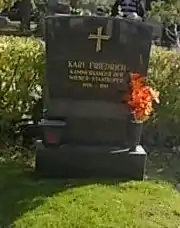Karl Friedrich (tenor)
Karl Friedrich (15 January 1905 – 8 April 1981) was an Austrian operatic tenor. A member of the Vienna State Opera from 1938 to 1970, he is regarded as one of the leading tenors at the house during World War II and afterwards.[1]
Life
Born in Vienna,[1] Friedrich began as an apprentice metalworker. He studied voice at the Vienna Academy.[2] He had his first engagement in 1931 in Karlsruhe, the following year in Ulm, the next year in Stralsund, from 1934 in Magdeburg, and from 1936 in Düsseldorf.[2] In 1937, he was invited to appear as Don José in Bizet's Carmen at the Vienna State Opera. A reviewer noted: "We have heard the flower aria only from Romanesque singers with the same passion and with such flowery lips, rarely with such beautiful messa di voce".[3] He then performed at the Salzburg Festival as Adolar in Weber's Euryanthe, conducted by Bruno Walter.[3] Friedrich became a member of the Vienna State Opera on 1 September 1938 and remained at the house until 1970.[1][2] He sang the entire lyrical-dramatic tenor repertoire.[4]
Friedrich was a regular guest at the Salzburg Festival.[2] He also performed many parts in Franz Lehár's operettas, both on stage and on radio. He recorded the complete operettas Giuditta and Paganini, and appeared as Florestan in a recording of Beethoven's Fidelio, conducted by Clemens Krauss.[2]
Friedrich was awarded the title Kammersänger in 1948.[1] He became an honorary member of the Vienna State Opera in 1973.[1]

Friedrich died in Vienna at age 76. He was buried in an honorary grave in the Vienna Central Cemetery.[1]
References
- "Friedrich, Karl". Oesterreichisches Musiklexikon (in German). Retrieved 16 July 2020.
- Kutsch, K. J.; Riemens, Leo (2012). Friedrich, Karl. p. 1574. ISBN 978-3-59-844088-5.
{{cite book}}:|work=ignored (help) - Spiegel, Klaus Ulrich. "Der Schokoladentauber / Klangsinn und Phrasierungskunst: Karl Friedrich". ku-spiegel.de (in German). Retrieved 16 July 2020.
- "Vorstellungen mir Karl Friedrich". Vienna State Opera (in German). Retrieved 16 July 2020.
External links
- Literature by and about Karl Friedrich in the German National Library catalogue
- Karl Friedrich on Vienna History Wiki
- Dokumente einer Sängerkarriere - Karl Friedrich on YouTube